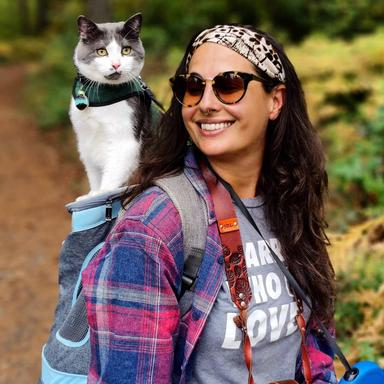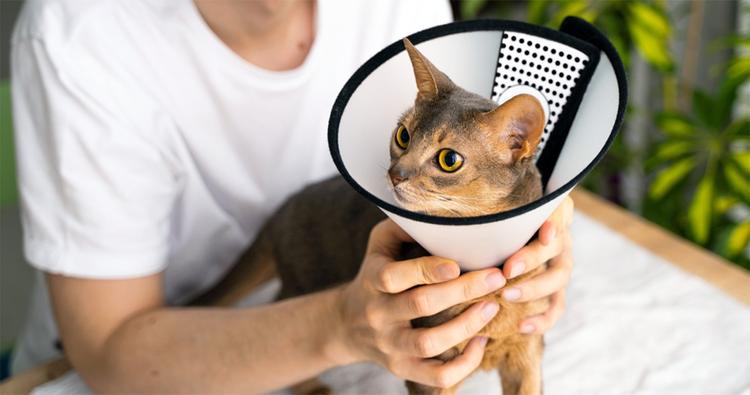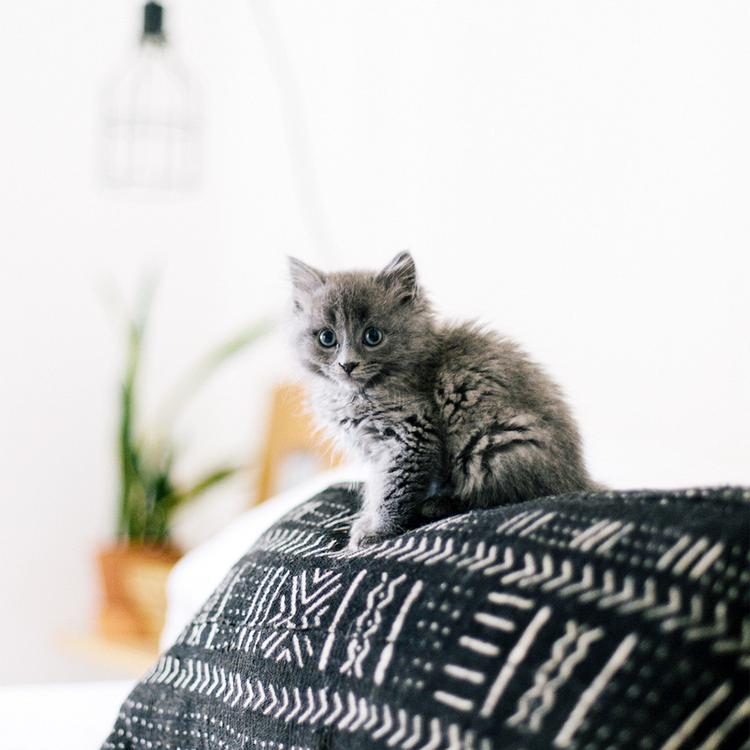Adopting a Cat with FIV? Here’s What You Need to Know
Life with an FIV+ cat isn’t so different after all
Life with an FIV+ cat isn’t so different after all
by Janelle Leeson, | May 22, 2024

Justin Mullet / Stocksy
Feline immunodeficiency virus (FIV) is a viral infection that can make cats more susceptible to getting sick. It’s most common in outdoor cats — intact, territorial males in particular — and passes through bodily fluids such as deep bite wounds. FIV can also be passed from an infected mama cat to her litter.
If you’re thinking about adopting an FIV-positive (or FIV+) cat, you might have some questions about long-term care and the risks for the rest of your household. Spoiler: FIV+ cats can live long, healthy lives with other pets. We spoke with experts to learn about FIV, and what it’s like to adopt and live with an FIV+ cat.
“FIV is similar to the human immunodeficiency virus, HIV,” explains veterinarian Jessica Jensen who works with The Vets, a mobile vet service. This can sound scary, but you don’t need to feel like you should avoid kitty kisses. FIV cannot be passed to humans, dogs, rabbits, hamsters, or any other being who is not a cat.
A deep bite wound is the most common cause of an FIV infection in cats. “Casual, non-aggressive contact, such as sharing water bowls or mutual grooming, does not appear to be an efficient route of spreading the virus,” reports the Cornell Feline Health Center.
While FIV can weaken a cat’s immune system, this isn’t always the case, according to Kelly Garlock, the lifesaving programs manager at Austin Pets Alive! There are four stages of FIV in cats, and with routine veterinary care, an FIV+ cat may never show advanced signs of it.
Acute stage: The cat was recently infected with the virus. They might have a slight fever, be lethargic, and have swollen lymph nodes. These signs are easily missed, or the cat simply appears healthy.
Asymptomatic stage: The cat is FIV+ but is overall healthy. The virus is present and active but isn’t causing any obvious symptoms. This stage can last for years.
Symptomatic stage: Some FIV+ cats can get sick because the virus weakens their immune systems. They might get frequent infections, lose weight, have a poor coat, or experience digestive issues. There is no cure for FIV, so vets may treat these secondary problems and find ways to support the cat’s immune system.
Terminal stage: If the weakened immune system isn’t supported — and secondary infections aren’t treated — the cat can develop serious complications such as severe infections or cancer.
Contrary to popular belief, FIV+ cats don’t need to be separated from other cats or pets.
While FIV is typically transmitted via deep bite wounds, it can also be spread through mating. “Since we should all be spaying and neutering our cats, we shouldn’t have to worry about mating,” says Samantha Bell, cat expert at Best Friends Animal Society.
However, fights in multicat households — which could lead to serious, skin-breaking bites — are a concern. Shelters often house FIV+ cats with other cats, including those who are FIV-. This points to their ability to adapt to a multi-cat household, as long as your existing cats are open to a new housemate. A slow, careful introduction is recommended for a smooth transition.
“I have fostered many FIV+ cats and integrated them into my home with my FIV- cats just fine,” Bell says. “Many of those big-headed male tomcats are FIV+ from their days on the streets — and many of them are the sweetest cats.”
Adopting a cat with FIV isn’t much different than adopting any other cat. Shelters may recommend keeping your FIV+ cat indoors or limiting their outdoor experiences to a catio or safe walks on a leash. This is good practice for keeping any kitty safe.
Be extra vigilant about vet visits, even for issues that seem minor. “A little cold may be no big deal to an FIV- cat,” Bell says, “but could be a big deal to an FIV+ cat.” As with any cat, staying up to date on vaccinations and scheduling regular checkups will keep your cat healthy.
If you need more support after adoption, Bell and Garlock point out that after-adoption support is available to all pet parents, whether you need help introducing cats to each other or have other concerns.
FIV is a manageable condition, not a death sentence, with many FIV+ cats living normal lifespans. Garlock says there’s a good chance that pet parents have had an FIV+ cat without even realizing it, because many cats never show symptoms.
With that said, here are some tips to ensure your FIV+ cat’s well-being:
Routine care: Schedule regular vet checkups, even if your cat seems healthy. While there’s no recommended FIV vaccine in North America (due to its increase in false positives), keeping other vaccinations current is important.
Early intervention: Be vigilant about any signs of illness. FIV+ cats can’t fight off infections as effectively as cats without FIV, so early vet visits are crucial.
Dental health: Brushing your cat’s teeth at home, and scheduling regular dental cleanings, are important for FIV+ cats. A healthy immune system can keep mouth bacteria in check, but this is more challenging for FIV+ cats, Bell explains. Even with regular dental care, prepare for the reality that your cat may need tooth extractions to prevent pain and difficulty eating.
Peaceful coexistence: If you have other cats, provide plenty of resources to minimize territorial squabbles. This includes litter boxes (one per cat, plus one extra), separate feeding areas, and plenty of resting and scratching areas.
While there is currently no recommended vaccine for FIV, it’s a manageable condition that can be prevented in other ways, such as with spaying, neutering, and not allowing your cat to roam freely outdoors. With proper care and a loving home, FIV+ cats can live long, happy lives.
With proper care, FIV+ cats can live normal lifespans of 12 to 18 years. Although FIV might weaken their immune system, regular vet checkups, an indoor lifestyle, and minimizing stress (such as providing enough litter boxes, especially in houses with multiple cats) can keep them healthy for many years.
FIV+ cats do not require special medication. These cats only require medication if needed to treat secondary infections.
Symptoms of a secondary infection caused by the weakened immune system of FIV+ cats include gingivitis/stomatitis, weight loss, poor appetite, fever, chronic conjunctivitis, swollen lymph nodes, vomiting, and diarrhea.
Yes, a cat can be born with FIV. An FIV+ mother can pass the virus to her kittens during pregnancy, but not all kittens born to an FIV+ cat will have the virus. Kittens can also become infected while nursing, but it’s more common for them to only receive antibodies from the milk. Meanwhile, testing kittens too early for FIV can result in a false positive result.
“No, FIV+ cats cannot infect humans with FIV. FIV is a feline-specific virus and cannot be transmitted to humans or other non-feline animals,” Jensen says.
Many shelters and rescue organizations are no longer testing every cat for FIV, due to the high rate (about 30 percent, according to Bell) of false-positive results. Even cats who have been bitten by an FIV+ cat might have the virus circulating in their blood, but they may not be permanently infected. “Every healthy cat should have a checkup once a year, and it’s up to the individual’s vet whether or not to test the cats for those diseases,” Bells says.
Often confused, feline leukemia virus (FeLV) and feline immunodeficiency virus (FIV) are two different diseases. FeLV is much more serious than FIV and is more easily transmitted. According to Cornell University’s College of Veterinary Medicine, FeLV can spread through any close cat-to-cat contact. Cats with FeLV typically have a shortened lifespan.
Feline Immunodeficiency Virus / FIV
Why Are Some Shelters No Longer Testing All Cats for FeLV and FIV?
Transmission of Feline Immunodeficiency Virus (FIV) Among Cohabiting Cats in Two Cat Rescue Shelters
Update on FIV: What Every Shelter Needs to Know
FIV in Cats: Feline Immunodeficiency Virus FAQs
VCA Feline Immunodeficiency Virus (FIV)
FIV-Positive and Negative Cats Living Together: What You Need to Know

Janelle Leeson is a Portland, Oregon-based freelance writer. Her work has been featured in magazines such as Inside Your Dog’s Mind, Inside Your Cat’s Mind, and Paw Print, as well online at Insider Reviews, NBC Select, Shop Today, PetMD, and Daily Paws. She has two adventure cats, a flock of urban chickens, and a soon-to-be-husband who doesn’t mind housing the occasional foster cat — or five.

Shelters & Rescue

Behavior & Training

Adoption Advice

Behavior & Training
From play bites to I’m-in-pain bites, we break down the many reasons felines may sink their teeth into you — to help you fix the issue.

Rehome
Found a stray cat? Follow these steps to ensure their well-being while you search for their people.

Adoption Advice
Here is why spaying or neutering your cat is important, and what to expect.

Adoption Advice
Preparing to introduce a new kitten to the family. Learn how you should prepare your home to ensure your kittens first days at home are safe and comfortable.

Adoption Advice
Considering cat adoption? Learn more about the pros and cons of adopting kittens.

Breed Info
Thinking of adopting a wild breed? Learn more about domesticated wild breeds and what it takes to keep them as pets.